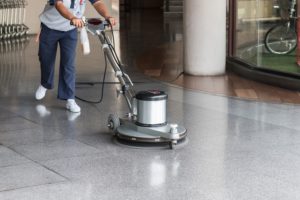

If hiring a new cleaning contractor, the owners and managers of senior and long-term care facilities must realize that just about everything has changed. What they looked for in a cleaning contractor before the pandemic and what they need to look for today can be the difference between night and day.
Let’s explore the issues.
Proof of insurance
Cleaning contractors must have a general liability policy. If their actions harm people or property, that policy should protect the center’s owners and managers.
Today, contractors must have more insurance than before. Right now, wrongful death suits are being filed against long-term care providers, claiming facilities were not thoroughly cleaned, resulting in illness and death.
If courts agree and the contractor has ample insurance, this should satisfy any damages. However, if the contractor does not have general liability insurance or not enough of it, costs and damages will likely find their way into the pocketbook of the facility.
Certifications
Cleaning is a skill, and in many parts of the world, it is taught in schools. In the U.S., one way to determine if a cleaning contractor has been professionally trained is to see if they have one or both of the following:
- CIMS Certification. The Cleaning Industry Management Standard is an education program that teaches cleaning best practices. It was created and is conducted by ISSA, the nonprofit, worldwide cleaning association. The program teaches workers the proper use of cleaning tools, solutions, sanitizers and disinfectants, knowledge so necessary now due to COVID-19.
- GBAC. The Global Bio-risk Advisory Council is also administered through ISSA. It provides education and training regarding infection control and disease prevention. This program grew out of the pandemic, and now entire facilities, as well as cleaning contractors, are taking steps to earn GBAC certification.
Quality assurance
The term quality assurance has been bandied around for decades in the professional cleaning industry. In the past, it became more of a marketing tool than something that is put into practice. It is no longer a marketing tool. When hiring a new cleaning contractor, it must be clear what type of quality assurance programs they have in place.
For instance, some contractors now use new apps that help them and their clients measure cleaning. While these apps can vary, here is an example of one used to evaluate floorcare:

Level 1: Floors and base moldings shine and are bright and clean. There is no dust buildup in corners or along walls.
Level 2: Floors and base moldings shine and are bright and clean. There is no buildup in corners or along walls. However, there may be up to two days’ worth of dust, dirt, stains or streaks.
Level 3: Floors are swept or vacuumed clean, but upon close observation, there appear to be stains. A buildup of dirt and floor finish in corners and along walls can be seen.
Level 4: Floors are swept or vacuumed clean, but are dull, dingy and stained. There is a conspicuous buildup of dirt and floor finish in corners and along the walls.
Level 5: Floors are dull, dirty, dingy, scuffed and stained. Further, there is a conspicuous buildup of old dirt and floor finish in corners and along walls.
This information is shared with all stakeholders so issues can be addressed if needed.
Another tool contractors are using are ATP monitors. These systems, which look like television remote controls, can measure the amount of organic material on surfaces. They do not indicate if the organic material is a virus, bacteria or germ. They just tell us if the material is present and in large enough amounts to be a health risk. This information is also shared with the client.
The professional cleaning industry has gone high-tech in other ways as well. What is most important is to select a contractor that is using systems such as these to help maintain high-quality cleaning in your facility.
Distributor partners
COVID-19 has intensified the need for cleaning contractors — and the owners and managers of facilities who hire them — to have an astute, well-versed janitorial distributor to work with.
Selecting cleaning solutions or disinfectants randomly at a mega-retail store or online can be risky as we make our way through this pandemic.
Further, several new cleaning technologies have been put into use because of the pandemic. Contractors must now consider whether an electrostatic sprayer should be used in your facility or a UV-C lighting system. What about disinfecting foggers?
A knowledgeable janitorial distributor can recommend types of cleaning and disinfecting systems that are most appropriate for a healthcare facility, helping eliminate trial-and-error purchasing. Ask your prospective cleaning contractor if they have a distributor partner who they work with and trust. It’s important.
Finally, make sure the contractor is open to meeting with you and your staff on a set basis. All too often, once the contractor is hired, that’s the last time you see them. We can’t have that anymore, not after this pandemic.
They are a part of your organization, your partner in protecting the health of those in your facility. Ensure they are aware of this and that meeting with them on an ongoing and frequent basis is part of their agreement with your organization.
Michael Wilson is vice president of marketing and packaging for AFFLINK, a global leader in supply chain optimization and packaging, and marketers of advanced cleaning products and technologies that minimize the spread of infection. He can be reached through at www.AFFLINK.com.





